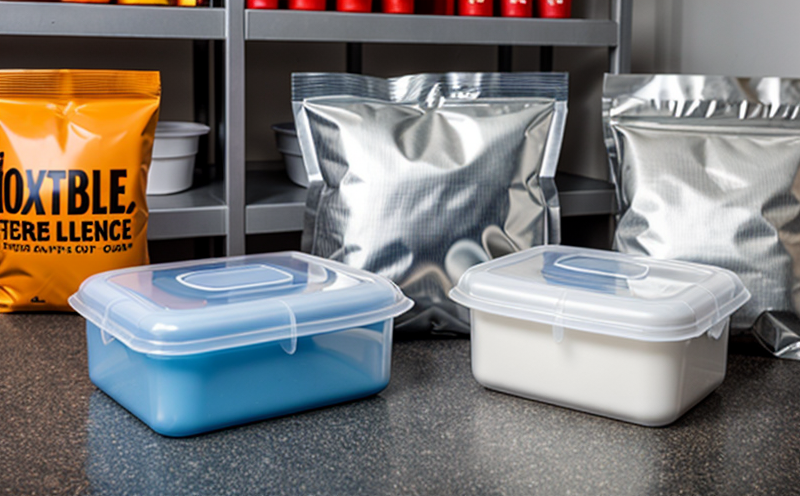ISO 15105-1 Gas Permeability Testing of Flexible Packaging
The ISO 15105-1 standard is a cornerstone in the field of flexible packaging testing. It provides a comprehensive framework for determining the gas permeability of materials used in flexible packaging, ensuring that these materials meet stringent quality and safety standards.
Gas permeability is critical to the performance of flexible packaging as it affects the shelf life and integrity of products contained within the packaging. Poor gas barrier properties can lead to product spoilage, loss of freshness, or even contamination. Therefore, accurate testing is essential for ensuring that the packaging meets industry expectations and regulatory requirements.
The test procedure outlined in ISO 15105-1 involves determining the rate at which gases pass through a specified area of the packaging material under controlled conditions. The process typically includes preconditioning the specimen to ensure it is free from moisture, temperature variations, or other external factors that could influence the test results.
The testing apparatus used for this purpose must adhere strictly to ISO 15105-1 specifications. This ensures consistent and reliable measurement of gas permeability across different specimens. The equipment should be capable of maintaining precise control over environmental conditions such as temperature, humidity, and pressure.
During the test, a known amount of gas is introduced into one side of the specimen, while the other side is sealed off. Over time, the gas diffuses through the material, and the rate at which this occurs is measured. The results are then used to calculate the permeability coefficient, which provides insight into the effectiveness of the packaging material in preventing gas ingress.
It's important to note that the choice of gases for testing can vary depending on the specific application. For instance, oxygen and carbon dioxide are commonly tested as they are the primary gases responsible for spoilage in many food products.
The results from this test play a crucial role in quality control processes within manufacturing facilities. They help ensure that the packaging meets internal standards as well as external regulatory requirements. Additionally, the data can be used to optimize material selection and design, leading to more efficient and effective packaging solutions.
Accurate testing is vital for maintaining product integrity and ensuring consumer satisfaction. By adhering to international standards like ISO 15105-1, manufacturers can demonstrate their commitment to quality and compliance, thereby building trust with customers and regulatory bodies alike.
Applied Standards
| Standard | Description |
|---|---|
| ISO 15105-1:2007 | This standard specifies the methods for determining the gas permeability of flexible packaging materials. It covers the principles, apparatus, and procedures necessary to conduct accurate gas permeability tests. |
| ASTM D3985 | An alternative American Society for Testing and Materials (ASTM) standard that provides similar methods but may differ in certain procedural details. |
| EN 14206 | This European Norm outlines additional requirements specific to packaging used in the food industry, which can complement ISO 15105-1. |
Eurolab Advantages
At Eurolab, we pride ourselves on providing comprehensive and accurate testing services that meet international standards. Our state-of-the-art facilities are equipped with the latest technology, ensuring precise measurement of gas permeability according to ISO 15105-1.
We employ highly skilled technicians who are knowledgeable about all aspects of flexible packaging testing. This expertise allows us to provide reliable results and valuable insights into your packaging's performance.
Our services extend beyond just the testing itself; we also offer consultation on material selection, design optimization, and compliance with international standards. Our team can help you navigate complex regulatory environments and ensure that your products meet all necessary requirements.
Additionally, Eurolab offers a wide range of other packaging tests such as burst strength, puncture resistance, and seal integrity testing. These services complement our gas permeability testing and provide a holistic approach to ensuring the quality and safety of your packaging solutions.
Competitive Advantage and Market Impact
Adhering to international standards like ISO 15105-1 is not only beneficial for maintaining product integrity but also plays a significant role in gaining competitive advantage within the market. Consumers are increasingly aware of the importance of food safety and freshness, which means that packaging with superior gas barrier properties can be more appealing.
Manufacturers who invest in rigorous quality control measures, including accurate testing according to ISO 15105-1, demonstrate their commitment to excellence. This can translate into higher customer satisfaction and loyalty, leading to increased market share and brand recognition.
In addition to consumer perception, regulatory compliance is crucial for avoiding potential legal issues and ensuring smooth operations within the industry. By staying up-to-date with relevant standards such as ISO 15105-1, companies can avoid costly penalties and reputational damage.





